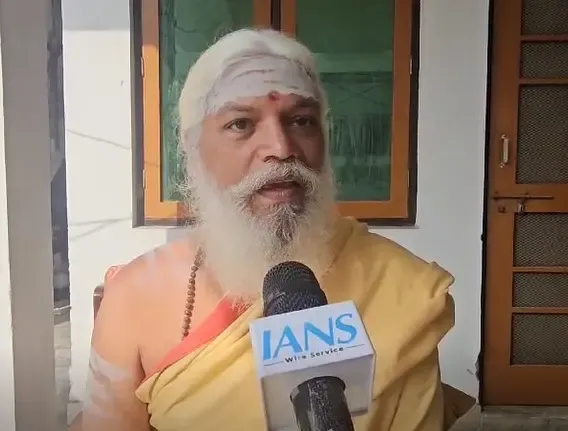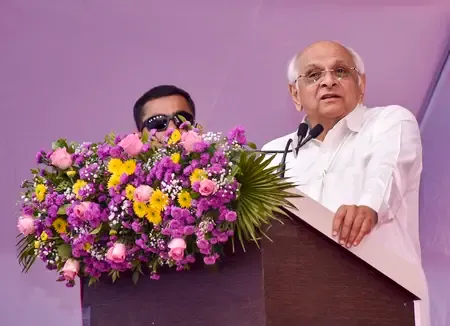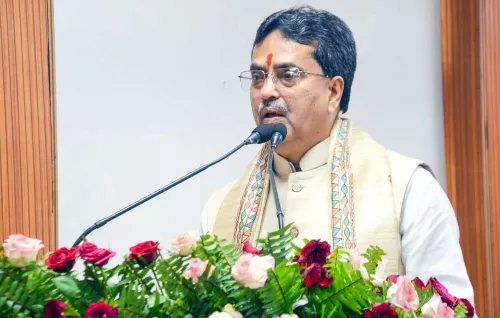IIT Graduate Jaishankar's Journey to Acharya

Synopsis
Key Takeaways
- Acharya Jaishankar's transformation reflects the power of spirituality.
- The encounter with Swami Dayanand Saraswati was pivotal in his journey.
- True happiness is rooted in self-realization, not material success.
- Dharma is essential for achieving Moksha.
- Participants should approach the Kumbh for self-purification.
Prayagraj, Jan 19 (NationPress) The Maha Kumbh in Prayagraj, Uttar Pradesh, has attracted lakhs of devotees from around the globe to the sacred Triveni Sangam. Among these seekers is Acharya Jaishankar, whose transformation from a successful material existence to spirituality exemplifies the remarkable influence of Indian culture.
Acharya Jaishankar, a graduate of IIT-BHU, was flourishing in the United States with a high-paying job and all material luxuries. However, he sensed a void that propelled him to delve into spirituality.
His pivotal moment occurred when he met his guru, Swami Dayanand Saraswati of the Arsha Vidya sect, whose ashram is located in Rishikesh. This meeting introduced him to Vedanta, the Indian philosophy that emphasizes self-realization and eternal happiness.
In an interview with IANS, Acharya shared insights about his spiritual path, stating, "Despite achieving so much materially, I observed that individuals, whether in India or the US, were not truly happy. Genuine happiness cannot be found in material possessions but in self-awareness and realization, as taught in Vedanta."
He emphasized that the idea of salvation and eternal happiness is distinctive to Indian culture, attainable through self-awareness and not reliant on the afterlife.
"Only happiness intertwined with sorrow can be experienced. Eventually, that happiness fades away. Hence, sorrow persists because one cannot halt the passing of what one possesses. Over time, union and separation will continuously occur. Under such circumstances, one must reflect on what is eternal in existence. Only that which transcends space and time can be everlasting. The scriptures reveal our true essence. This is the crux of Vedanta. The scriptures affirm that we are infinite, that we embody the essence of knowledge. Upon acquiring this knowledge, one can attain happiness," he articulated.
"Our scriptures impart that we are boundless and represent the essence of knowledge. This realization leads to everlasting joy," he noted.
Highlighting the significance of adhering to Dharma, Acharya remarked, "Dharma is the foremost Purusharth (goal) outlined in our scriptures. Without Dharma, there is no Moksha (liberation). Every action must align with Dharma."
Acharya Jaishankar also commented on Abhey Singh, an IITian-turned-saint previously accused of drug use before embracing spirituality. He encouraged individuals to prioritize a person's current journey over their past.
"Like rivers that purify despite their origins, the present deeds of a saint should be of greater importance than their history. Tales of sages like Valmiki remind us of the transformative capacity of Dharma."
Acharya praised the government for the arrangements at the Maha Kumbh, emphasizing that this event presents an unmatched opportunity for spiritual development.
He urged participants to view the Kumbh as an opportunity for self-purification rather than a mere tourism experience.
Acharya Jaishankar encouraged individuals to incorporate the principles of Dharma and Vedanta into their everyday lives for a fulfilling existence.
"True joy is discovered in recognizing our infinite essence, as illuminated by our scriptures," he concluded.
The Maha Kumbh continues to motivate individuals globally, bridging material success with spiritual enlightenment and highlighting the profound wisdom inherent in Indian culture.










